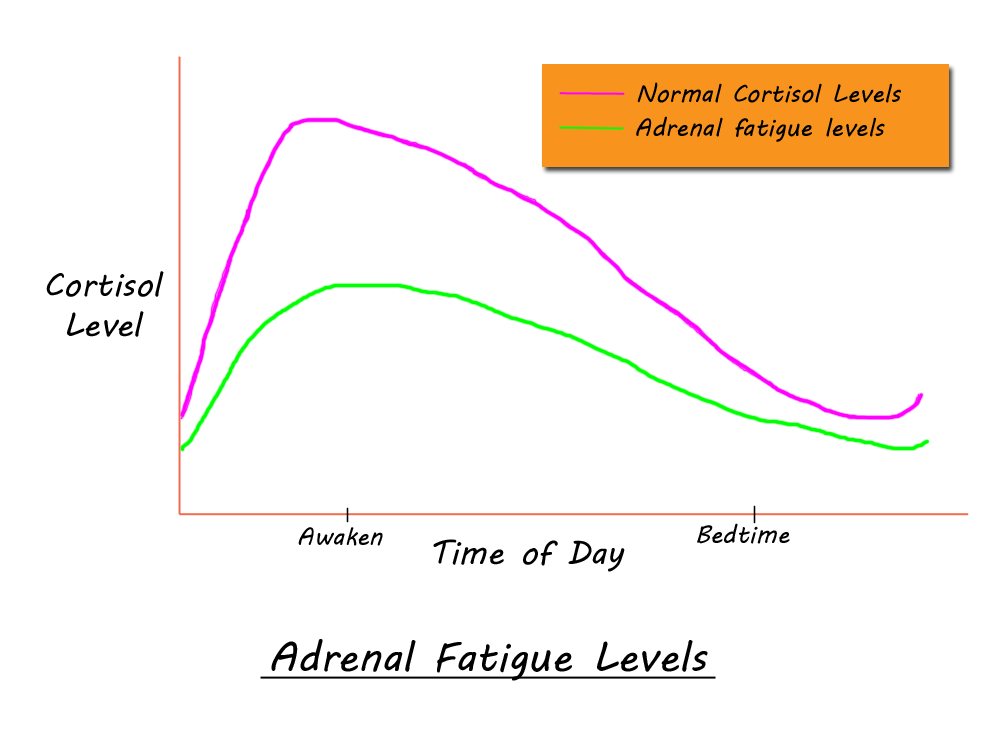We all become run-down now and then due to the stresses of everyday life and the demands of our busy schedules. Over extended periods of time this can overburden our bodies, creating a situation that’s not so easy to bounce back from. In particular the adrenal glands, being in charge of the release of various stress hormones, can become exhausted and unable to effectively do their job. This is referred to as “adrenal fatigue.” When this happens, our fatigue can become chronic and be joined by other symptoms such as pain and inflammation.
1.About Adrenal Fatigue
The adrenal glands have many functions, including the secretion of cortisol and other hormones in response to stress. Stress comes in many forms: physical, psychological, emotional, mechanical, chemical, environmental, etc. It can come from an emotional trigger like a fight with a loved one or trouble at work. It can also come from a physical trigger like an injury or motor vehicle accident.
When prompted by pain or inflammation cortisol is released from the adrenal glands into the blood. Cortisol modifies the inflammatory pathways resulting in a decrease in inflammation and pain. When a drop in blood sugar occurs cortisol is secreted to help balance the levels of sugar in the blood. Cortisol is also released from the adrenal glands in a 24-hour daily rhythm with a burst in the morning to help us awake and a decrease in the evening to help us sleep.
When adrenal glands are required to secrete at high levels for extended periods of time due to prolonged stress, pain, or blood sugar imbalances, they can become fatigued or begin to secrete cortisol at lower levels. When this occurs it is common to see an increase in fatigue, pain and/or inflammation.
2. Symptoms of Adrenal Fatigue
The list of possible symptoms is quite long (75+). Below are a few of the more common that you may find relatable.
- Insomnia
- Low Blood Pressure
- Low libido and lack of sex drive
- Feeling hypoglycemic despite normal lab values (getting hangry a lot)
- Depression
- Anxiety, often accompanied by panic attacks
- Brittle hair and thinning skin/fingernails
- Not feeling rested despite a full night of sleep
- Feeling “wired” and unable to relax
- Feeling tired in the afternoon between 3 and 5.
- Needing coffee to get going in the morning.
- Feeling tired between 9 and 10 pm.
- Craving for salty food such as potato chips
- Cold hands and feet; general sensitivity to cold.
- Abdominal fat accumulation.
- Generalized pain and inflammation.
- Weight loss with more advanced cases
3. The Adrenal Fatigue Controversy
Adrenal Fatigue is increasingly common, yet there still remains an unwillingness among medical doctors to diagnose it. There are essentially three reasons for this:
1. Lab Tests are Inconclusive.
2. It is not yet formally recognized as a diagnosis.
3. There is no pharmacological solution.
“Adrenal fatigue is not a real medical condition. There are no scientific facts to support the theory that long-term mental, emotional, or physical stress drains the adrenal glands and causes many common symptoms.”
– Hormone Foundation
“Any doctor worth his/her salt understands that the term “adrenal fatigue” means mild adrenal insufficiency. The Hormone Foundation statement readily admits that adrenal insufficiency IS a real diagnosis. To me, they seem to be denying the possibility that some people might have a mild form of a real diagnosis. That’s short-sighted and excessively arbitrary.” – Richard Shames, MD
In time this will change, but what does that mean for you in the meantime?
If you suspect that you are suffering from adrenal fatigue, taking an adrenal fatigue assessment quiz is a good first step. If you answer yes to more than 10 questions may indicate that you have been under sustained stress. In the case that you have been experiencing a number of physical and/or psychological symptoms a deeper assessment of your Diurnal Cortisol levels may be appropriate.
4. Recovering From Adrenal Fatigue
The Approach to Adrenal Fatigue in short:
• Diet Modification: Eating a diet rich in fruits, vegetables, whole grains and legumes that provides antioxidants and nutrients is essential for adrenal health (i.e. an anti-inflammatory diet). The adrenal glands need a good diet rich in B vitamins, vitamin C, zinc and magnesium. Eating quality protein at each meal allows the body to maintain healthy levels of blood sugar without taxing the adrenals. Eliminating caffeine and alcohol is also crucial.
• Lifestyle Modification: In a word, Stress Management. With adrenal issues stress management is vital to any treatment. Proper sleep, stress reduction techniques such as deep breathing or meditation and exercise can all increase the body’s ability to handle stress.
• Supplementation: providing extra nutrition through a multivitamin, increasing minerals available to our system through the use of raw sea salt, and using adaptogens to help balance your hormones and manage your stress response.
Be gentle with yourself. Give your body the permission and time that it needs to heal.

